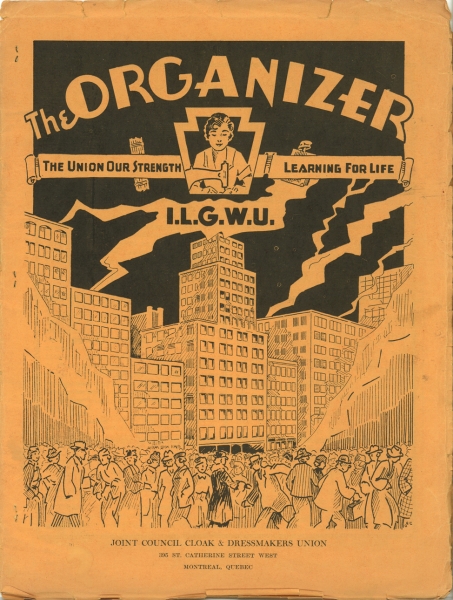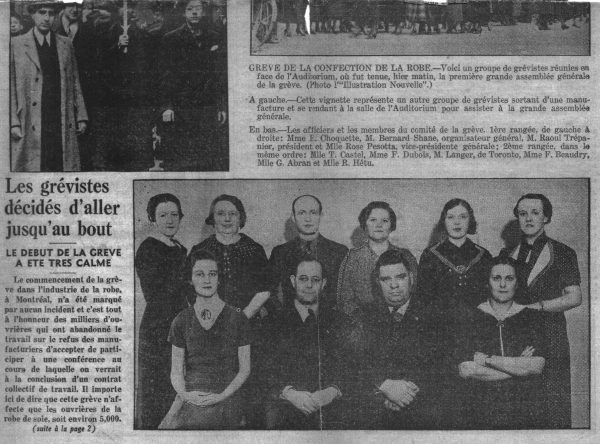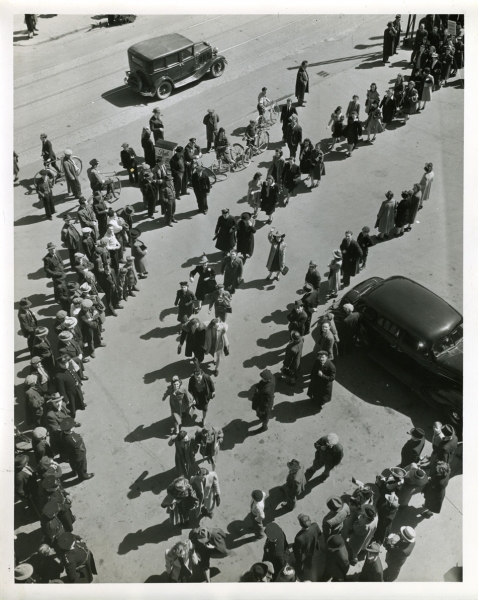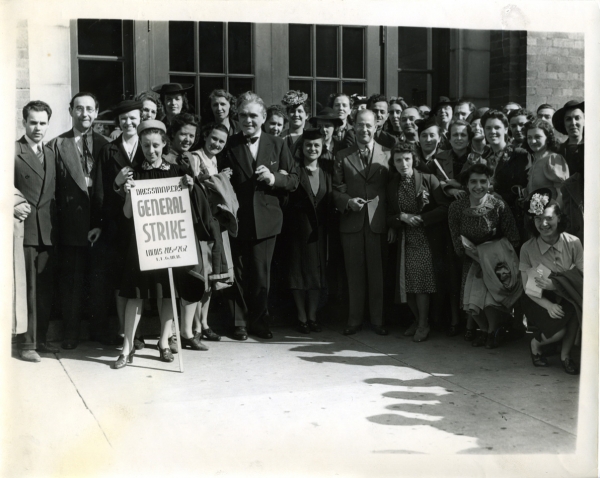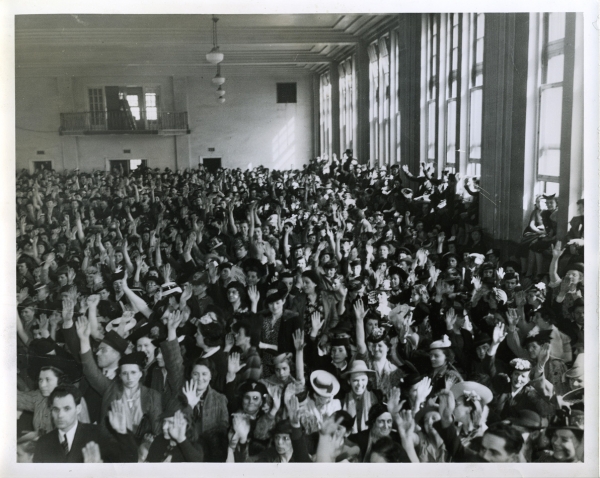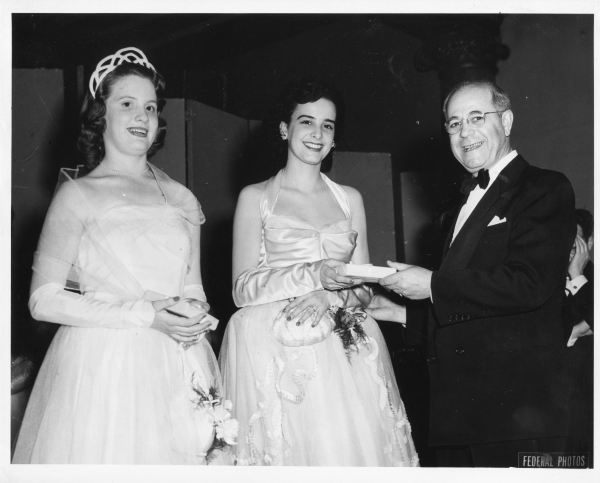Les Midinettes Strike (1937) - Midinettes
1933 - 1937
Ste-Catherine O. et Bleury
Bernard Shane, manager of the International Ladies’ Garment Workers’ Union (ILGWU) in Canada, arrived in Montreal from the United States in the winter of 1934. Working alongside the future Canadian Labour Congress president Claude Jodoin, and Rose Pesotta, an exceptionally effective (and fellow Jewish American) ILGWU organizer, as well as talented organizers like Léa Roback, Shane’s ILGWU spearheaded the unionization of Montreal’s garment industry, in particular the galvanizing 1937 strike of les midinettes, or the dressmakers.
The unionization movement began in earnest with the successful acquisition of a cloak cutters’ contract in 1934. The subsequent unionization of dress cutters in 1936 helped union leaders reach the isolated midinettes. ILGWU Local 262 was created in January 1937 at a small, secretive meeting. In addition to the women’s legitimate fear that they might lose their jobs for associating with union workers, a failed strike led by the Communist-affiliated Needle Trades Workers’ Industrial Union two years earlier had left les midinettes distrustful of unions. Their resolve would be tested much sooner than expected: the next day, l’Illustration Nouvelle printed a photograph of the meeting, including names of charter members. As les midinettes had feared, many were fired from their factory jobs before the end of the day. Their first strike was three days long, in freezing weather, but Shane’s negotiation skills brought the discharged workers back to their jobs, and allowed les midinettes to affiliate with the new Dressmakers’ Union (ILGWU Local 262).
Real change was yet to come. Only a few months later, on April 7, 1937, the union held a mass meeting of dressmakers to approve the demands that Shane, Pesotta and the rest of the union team would bring to the Manufacturers’ Guild. If their demands were not met, they voted to hold a general strike. On Thursday, April 15th, the first of 5,000 picketers appeared in the garment district at dawn. The entire industry came to a screeching halt—the effect was so massive that Quebec Premier and Attorney General Maurice Duplessis called for the arrest of the main union leaders, including Shane and Pesotta. The warrants—such an arrest would have been illegal—were never served. On May 10, after fourteen hours of negotiations, the strike was won. Agreeing on wage increases, a union shop, a 44-hour work week, and overtime pay of time-and-a-half, Local 262’s general strike of 1937 was an inspiration to workers nationwide.
The 1937 strike established the ILGWU in Montreal’s garment industry and gave the workers a larger voice, an important feat that would prove useful in 1940 when the ILGWU was forced to strike again.
Compiled by Sarah Woolf
Links
Liens
Sources
Guillemette, Aldea. "Foreward."Les / The Midinettes: 1937/1962. Eds. Bantey, Edward and Union International Ladies' Garment Workers. [Montréal]: Bureau conjoint, Montréal, Union internationale des ouvriers du vêtement pour dames, Montreal Joint Board, International Ladies' Garment Workers' Union, 1962. 65-66.
Lambertson, R. "'The Dresden Story': Racism, Human Rights, and the Jewish Labour Committee of Canada." Labour/Le Travail 47 (2001): 43-82.
Leeder, Elaine J. The Gentle General : Rose Pesotta, Anarchist and Labor Organizer. SUNY series in American labor history. Albany, N.Y.: State University of New York Press, 1993.
Pesotta, Rose. "The Beginning." Les / The Midinettes: 1937/1962 . Eds. Bantey, Edward and Union International Ladies' Garment Workers. [Montréal]: Bureau conjoint, Montréal, Union internationale des ouvriers du vêtement pour dames, Montreal Joint Board, International Ladies' Garment Workers' Union, 1962. 70-72.
Shane, Bernard. "Great Moments." Les / The Midinettes: 1937/1962. Eds. Bantey, Edward and Union International Ladies' Garment Workers. [Montréal]: Bureau conjoint, Montréal, Union internationale des ouvriers du vêtement pour dames, Montreal Joint Board, International Ladies' Garment Workers' Union, 1962. 109-23.
Sicherman, Barbara, and Carol Hurd Green. Notable American Women: The Modern Period: A Biographical Dictionary. Cambridge, Mass.,:Belknap Press of Harvard University Press, 1980.
Steedman, Mercedes. Angels of the Workplace: Women and the Construction of Gender Relations in the Canadian Clothing Industry, 1890-1940. Toronto: Oxford University Press, 1997.
Tulchinsky, Gerald J. J. Branching Out: The Transformation of the Canadian Jewish community. Toronto, Canada; New York, N.Y.; Buffalo, N.Y.: Stoddart, 1998.


This project is funded in part by the Government of Canada.
Ce projet est financé en partie par le gouvernement du Canada.
Ce projet est financé en partie par le gouvernement du Canada.
This project is funded in part by the Government of Canada.
© 2011-2015 Museum of Jewish Montreal, All Rights Reserved.
Site by Air Code Design inc. ![]()
© 2011-2015 Musée du Montréal Juïf, Tous droits réservés. Site par Air Code Design inc. ![]()
